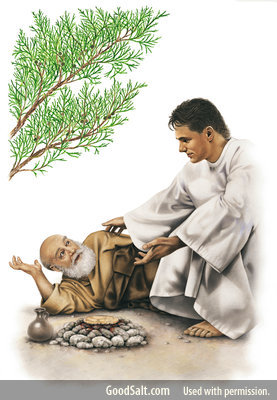“And there he went into a cave, and spent the night in that place; and behold, the word of the Lord came to him, and He said to him, ‘What are you doing here, Elijah?’ ” I Kings 19:9
After his incredible victory on Mt. Carmel the prophet Elijah descended into the pit of discouragement following a death threat from wicked Queen Jezebel (I Kings 18:20-19:2). In response to Jezebel, Elijah isolated himself in the wilderness and asked God to take his life (I Kings 19:3-4). Although Elijah had plunged into the depths of discouragement, God had not given up on him. The Lord was slowly bringing His prophet up out of this pit of discouragement by providing rest and food for him through an angel (I Kings 19:5-7a). But Elijah also needed to spend time in the Lord’s presence to get back up on his feet, so the Lord gave him a journey to take to Mt. Horeb about 200 miles away.
After traveling forty days and nights on foot, Elijah arrived at Mt. Horeb “and there he went into a cave, and spent the night in that place; and behold, the word of the Lord came to him, and He said to him, ‘What are you doing here, Elijah?’ ” (I Kings 19:9). What method of communication does the Lord use here? A question. Why does the Lord ask a question He already knows the answer to? To get Elijah to share his feelings.
And Elijah answered truthfully: “I have been very zealous for the Lord God of hosts; for the children of Israel have forsaken Your covenant, torn down Your altars, and killed Your prophets with the sword. I alone am left; and they seek to take my life.” (I Kings 19:10). Elijah is saying, “Lord, I’m angry. I’m the only one serving You among Your people. The rest don’t care about You. I’m all alone and I’m afraid they’re going to kill me!” God was not shocked by Elijah’s feelings. He allows His prophet to let off steam. This is our next principle for climbing out of the pit of discouragement: GIVE YOUR FRUSTRATIONS TO THE LORD (I Kings 19:9-10). Verbalizing our feelings can clarify our thinking. Stuffing emotions can distort our spiritual perspective.
There are at least six emotions that Elijah has been feeling since Jezebel threatened his life:
– Fear: “And when he saw that, he arose and ran for his life.” (I Kings 19:3a).
– Hopelessness: “And he prayed that he might die, and said, ‘It is enough! Now, Lord, take my life…’ ” (I Kings 19:4a).
– Guilt: “… for I am no better than my fathers!” (I Kings 19:4b).
– Anger/Resentment: “I have been very zealous for the Lord God of hosts; for the children of Israel have forsaken Your covenant, torn down Your altars, and killed Your prophets with the sword.” (I Kings 19:10a).
Loneliness: “I alone am left.” (I Kings 19:10b).
Worry: “and they seek to take my life.” (I Kings 19:10c).
When we combine fear, hopelessness, guilt, anger/resentment, loneliness and worry, and keep them all pent up inside us, we are asking for discouragement! So God draws these pent up emotions out of Elijah by asking a question. He says, “Elijah, what’s frustrating you? What’s eating you up?”
When we are discouraged, this is exactly what we need to do – give our frustrations to the Lord. Unfortunately, many Christians have been taught that feelings are wrong. “Good Christians do not feel afraid, angry, depressed, hopeless, lonely, resentful, or worried,” they are told. Or worse, they are taught that their feelings are actually demons. “You have a demon of fear… anger… depression… guilt… hopelessness… loneliness… resentment or worry.” Their feelings are spiritualized by well-intentioned, but misguided believers.
What these misconceptions have done is keep Christians from healing their wounds. God knows that we must feel to heal. This is why He recorded the writings of King David in the Psalms. Even though King David was an adulterer and a murderer, God still assessed his life “as a man after My own heart” (Acts 13:22). What was it about this man that led God to speak so highly of him? I believe one reason God said this about David is because he was very honest and open before the Lord. And God was so impressed with David’s honesty and vulnerability in the Psalms that He refers to him as a man after His own heart.
How can we give our frustrations to the Lord? Like David, we need to talk to the Lord about them. If you are not sure how to verbalize your feelings to the Lord, pray some of the Psalms back to God that express…
– Anger/Resentment (Psalm 4, 5, 6, 10, 13, 17, 35, 37, 42, 52, 54, 58, 69, 70, 79, 83, 109, 137, 140)
– Fear (Psalm 3, 4, 9, 16, 23, 27, 31, 32, 34, 46, 56, 62, 91, 112, 118, 121)
– Grief/Sadness (Psalm 6, 23, 25, 30, 42, 59, 61, 86, 116, 118, 147)
– Guilt (Psalm 25, 32, 25, 40, 51, 85, 86, 103, 130
– Hopelessness (Psalm 5, 25, 27, 33, 34, 37, 39, 40, 42, 43, 46, 52, 57, 60, 62, 65, 71, 91, 94, 108)
– Loneliness (Psalm 17, 23, 25, 27, 39, 68, 73, 102, 142, 147)
– Worry (Psalm 4, 9, 16, 23, 25, 27, 31, 34, 40, 42, 46, 55, 56, 61, 62, 84, 91, 94, 103, 112, 116, 121, 139, 145)
You may want to write down your prayers to God which can help you release your emotions to Him. Carrying unprocessed feelings inside us can contribute to our discouragement and stress.
Early in life, our brains discerned if the world was safe or dangerous. If our brains determined that the world was dangerous, it created protective personalities to keep us from being hurt. So instead of learning to trust others and God, we concluded that we did not need God or others to avoid being hurt. Our tendency is to avoid taking risks and being vulnerable before God and other people. But this only leads to more discouragement and stress.
God understands this and He wants to set us free from these protective walls we have created for ourselves. We can learn from Elijah the importance of giving our frustrations to God. We do this by being vulnerable before Him. The Bible tells us, “Trust in Him at all times, you people; pour out your heart before Him; God is a refuge for us.” (Psalm 62:8). We can trust the Lord with our feelings because He is “a refuge for us.” He is safe to be transparent and vulnerable with. He is benevolent and understanding. He sympathizes with our weaknesses (Hebrews 4:15).
Prayer: Precious heavenly Father, thank You for asking Elijah what he was doing in that cave. Elijah’s response showed that he needed to release all the pent up emotions he had been carrying since Queen Jezebel threatened his life. Like Elijah, we can stuff our emotions down inside us and experience discouragement and distress as a result. Lord, please show us if there is anything in our lives that we need to release to You. You already know the feelings we have and You are eager to hear us talk to You about them. How we feel does not change Your love for us. Some of us have learned to avoid our feelings because it was not safe to identify them or share them with others when growing up. Help us see that we are safe in Your presence now. We can be vulnerable before You with our emotions just like Elijah was. In the gracious name of Jesus we pray. Amen.







